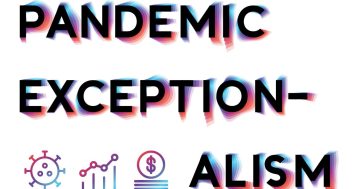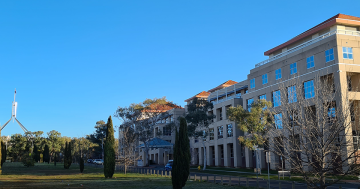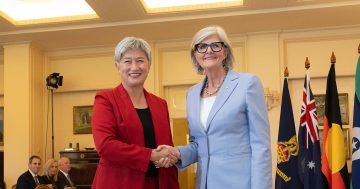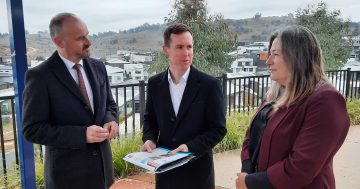Quentin Grafton, Tom Kompas, and Hoang Long Chu* say the economic benefits of mandated mask wearing in indoor public spaces are so large that they just might determine whether Australia avoids a recession or not.
 On Monday 25 July, Australia had its highest ever number of COVID-19 hospitalisations, with 5,429 patients with COVID-19 in Australian hospitals in the previous 24 hours.
On Monday 25 July, Australia had its highest ever number of COVID-19 hospitalisations, with 5,429 patients with COVID-19 in Australian hospitals in the previous 24 hours.
This devastating third Omicron wave means that there will be tens of thousands more hospitalisations and possibly millions more COVID-19 cases over the coming months.
The new Australian federal government was elected on a promise of policy reform and has committed to ‘not to bury its head in the sand’ like its predecessor.
But when it comes to ‘living with the virus’, is good policy compatible with smart politics?
Polls indicate that 60 per cent of Australians think mask wearing should return this winter and only six per cent of people said 5,000-10,000 fatalities per year – the rate at the time of polling – from COVID-19 was acceptable.
Despite this, mandated mask wearing in indoor public spaces appears to be off the policy table in Canberra and other state and territory capitals.
A recent picture of Prime Minister Anthony Albanese receiving his second booster to encourage others to do follow suit is laudable.
But he did so unmasked, and with an unmasked person vaccinating him.
Thus, it shows a leader failing to deliver a strong message about the importance of mask wearing.
If there is one thing the COVID-19 pandemic should have taught politicians it is that public messaging must be clear, consistent, and transparent if public health interventions are to be effective.
There is unequivocal evidence that widespread mask wearing in indoor public spaces substantially reduces the rate of infection, possibly by as much as 50 per cent.
This is because most infections are due to airborne transmission.
For this reason, and because Australia has a public health crisis triggered by the patient overload from COVID-19, the Australian Medical Association (AMA) is urging a return to mask wearing in indoor public spaces and for governments to follow public health advice.
But the AMA advice is falling on deaf ears.
Victoria’s health minister recently chose not to accept her Chief Medical Officer’s advice to mandate mask wearing in early education and retail settings.
This same advice specified that these public health interventions would substantially reduce hospital admissions.
While the Victorian minister’s decision was supported by those who want Australians to ‘move on’ and advocate against mandated mask wearing, she tellingly also noted that she “…had the opportunity to consult with industry leaders” prior to making her decision.
The implication was that an economic calculation was, at least in part, behind her decision.
Since the start of the pandemic, there has been a consistent myth propagated by some that what is good for public health is frequently bad for business.
Yet it was countries like Australia that closed their borders early, undertook widespread testing, tracing, and quarantine, and imposed severe social distancing when necessary that were the better economic performers.
The key justification for not reinstating mandating mask wearing in Australia is the unsubstantiated claim that it imposes too great a cost on the economy.
To test this claim, we have evaluated two scenarios.
First is a ‘business-as-usual’ economic outcome, where we calculated how increased COVID-19 cases in the community reduced labour hours in Australia; assuming current public health settings are left unchanged.
Second is a situation where additional public health interventions, including mandated mask wearing, are implemented.
In this scenario, we calculated the avoided losses of labour hours from reduced COVID-19 cases because of additional public health measures such as mandated mask wearing.
Our results are revealing.
Public health interventions have a cost, but leaders should also acknowledge the economic costs of many, many more Australians getting sick as a result of not following the AMA and other public health advice.
We found that the estimated percentage decline in economic output, under business as usual, from lost labour work hours due to COVID-19 in 2022 is between 2.2 per cent and 3.4 per cent.
When combined with rising interest rates, this reduction in labour output from COVID-19 is big enough to push Australia into a recession in the coming months.
Assuming public health measures would reduce cumulative cases by 30 to 50 per cent, our cost-benefit analysis indicates that it is much better for the economy and public health to reimpose sensible measures such as mandated indoor mask wearing during the current Omicron third wave.
Our results compared the benefits and costs of implementing low-cost and effective public health interventions that reduce infections during the peak of an epidemic.
An epidemic that is dangerous enough that it could even be the leading cause of deaths in Australia in 2022.
While our analysis includes all direct costs of the public health interventions, including masks, air filters, and more, it does not include the economic costs of COVID-19 fatalities.
Nor does it include the extra health costs of a larger portion of the population suffering from debilitating long COVID.
In other words, our cost-benefit analysis likely understates the net economic benefits of enforced, mandated mask wearing in indoor public spaces during the current COVID-19 wave.
The bottom line from our calculations is that reintroducing enforced mandatory mask wearing in indoor public spaces in Australia over the next few months, in response to the current surge in COVID-19 cases, is good for both the economy and public health.
Sometimes politicians change their minds, as they did on paid pandemic leave, and as New Zealand did on 22 July when it reintroduced enforced mask wearing at schools.
They also must change their minds, and as soon as possible, about enforced, mandated mask wearing, because it is both good policy and smart politics.
*Quentin Grafton is Director of the Centre for Water Economics, Environment and Policy (CWEEP) at Crawford School of Public Policy. Tom Kompas is a Professor of Environmental Economics and Biosecurity in the School of Biosciences and the School of Ecosystem and Forest Sciences at the University of Melbourne. Hoang Long Chu is an Associate Professor and data analyst within the Arndt-Corden Department of Economics at Crawford School of Public Policy.
This article first appeared at policyforum.net.











